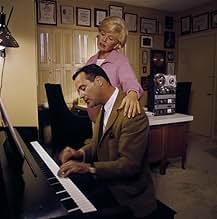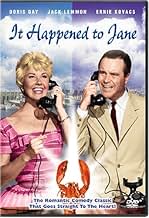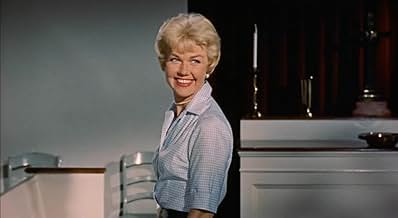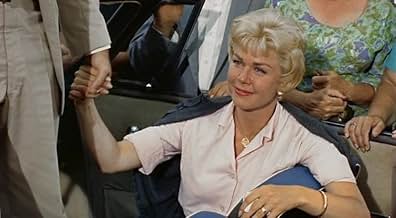IMDb-BEWERTUNG
6,5/10
3265
IHRE BEWERTUNG
Jane Osgood betreibt ein Hummergeschäft, mit dem sie ihre beiden kleinen Kinder unterstützt.Jane Osgood betreibt ein Hummergeschäft, mit dem sie ihre beiden kleinen Kinder unterstützt.Jane Osgood betreibt ein Hummergeschäft, mit dem sie ihre beiden kleinen Kinder unterstützt.
Max Showalter
- Selwyn Harris
- (as Casey Adams)
Robert Paige
- Bob Paige - Host 'The Big Payoff'
- (as Bob Paige)
Empfohlene Bewertungen
This has to be the most underrated and overlooked of the comedies from Doris Day's later career. I'm surprised at the relatively low score it has received here on IMDb, as it's a really fun and entertaining movie (particularly following the unfortunate Tunnel of Love she appeared in the prior year).
Rather than the lush, opulent interiors and wardrobe we usually look forward to in a Day comedy, this one is stunning for its exteriors. Filmed in New England in the summer of 1958, the film exudes idyllic small town splendor. Day plays Jane Osgood, a widowed entrepreneur (all "independent" women in 1950's TV or movies are either widows, as in Lucille Ball's later television work, or impossible-to-marry shrews like Joan Crawford in The Best of Everything). Osgood operates a budding lobster business, and when an expensive shipment is ruined by the laxity of the railroad, she takes on railroad magnet Harry Foster Malone in a highly publicized David & Goliath lawsuit. Ernie Kovacs is particularly memorable in his portrayal of Harry Foster Malone, an obvious and amusing allusion to Orson Welles' Charles Foster Kane, which was of course an allusion to William Randolph Hurst. In her legal battle, Osgood enlists the aid of local attorney and old friend George Denham, the man she's "supposed" to be with and just doesn't realize it, played well by a young Jack Lemmon. Throughout the course of the story, the film seems to at regular intervals inject some rather insightful observations on a multitude of thought-provoking topics, including the place and nature of democracy in a capitalist society, the overwhelming power wielded by big business, even the (at the time) ever expanding place of television in our lives and its ability to influence and inform. And all of this in a comedy!
The only negative I can think of is the inclusion of perhaps the worst musical number ever put on film. Jane Osgood is the den mother of the local boy-scout troop (naturally) and at the camp out in her back yard she leads them in a sing-a-long of the single most stupid, dreadful and endless song you ever heard in your life. "Be Prepared" well they warned you! It starts out as amusingly bad, but then seems to last about fifteen or twenty minutes until you think you'd rather take your own life than hear one more note. Any self-respecting boy scout over the age of five would kick you right in the nuts if you asked him to sing this wretched torturous piece of nonsense.
This aside (it is unfortunately not that uncommon in films of this era), this film benefits well from a strong, well written script and an excellent cast. It is actually much more intelligent and heart-warming than any of the Doris Day-Rock Hudson pairings, and while it is a very different kind of film, it can hold its own against any of those. Highly recommended, but be prepared to hit the "mute" button when those boy-scouts start singing!
Rather than the lush, opulent interiors and wardrobe we usually look forward to in a Day comedy, this one is stunning for its exteriors. Filmed in New England in the summer of 1958, the film exudes idyllic small town splendor. Day plays Jane Osgood, a widowed entrepreneur (all "independent" women in 1950's TV or movies are either widows, as in Lucille Ball's later television work, or impossible-to-marry shrews like Joan Crawford in The Best of Everything). Osgood operates a budding lobster business, and when an expensive shipment is ruined by the laxity of the railroad, she takes on railroad magnet Harry Foster Malone in a highly publicized David & Goliath lawsuit. Ernie Kovacs is particularly memorable in his portrayal of Harry Foster Malone, an obvious and amusing allusion to Orson Welles' Charles Foster Kane, which was of course an allusion to William Randolph Hurst. In her legal battle, Osgood enlists the aid of local attorney and old friend George Denham, the man she's "supposed" to be with and just doesn't realize it, played well by a young Jack Lemmon. Throughout the course of the story, the film seems to at regular intervals inject some rather insightful observations on a multitude of thought-provoking topics, including the place and nature of democracy in a capitalist society, the overwhelming power wielded by big business, even the (at the time) ever expanding place of television in our lives and its ability to influence and inform. And all of this in a comedy!
The only negative I can think of is the inclusion of perhaps the worst musical number ever put on film. Jane Osgood is the den mother of the local boy-scout troop (naturally) and at the camp out in her back yard she leads them in a sing-a-long of the single most stupid, dreadful and endless song you ever heard in your life. "Be Prepared" well they warned you! It starts out as amusingly bad, but then seems to last about fifteen or twenty minutes until you think you'd rather take your own life than hear one more note. Any self-respecting boy scout over the age of five would kick you right in the nuts if you asked him to sing this wretched torturous piece of nonsense.
This aside (it is unfortunately not that uncommon in films of this era), this film benefits well from a strong, well written script and an excellent cast. It is actually much more intelligent and heart-warming than any of the Doris Day-Rock Hudson pairings, and while it is a very different kind of film, it can hold its own against any of those. Highly recommended, but be prepared to hit the "mute" button when those boy-scouts start singing!
This is a fun period movie. It's a great snap shot of rural New England in the late 1950's. I remember watching this movie when I was a young boy growing up in the Hartford area of Connecticut. Thought the story is about the fictitious town, Cape Anne, Maine, the story was actually filmed in Connecticut. I remember everyone being excited about the movie because they had filmed scenes at the Hartford Railroad Station, one being where George kisses Jane. Back then we all had traveled someplace from the Hartford Station. The movie's vivid color gives us great views of the landscape, the old New England houses, stores, churches, and court house. The "Town Meeting" as it was, and still is, in some ways still in Maine, New Hampshire, and Vermont. The various types of cars of the time, and of course the different trains. It's a great story of the little guy (gal in this case) against the big corporation. Doris Day and Jack Lemmmon are at their best as well as the supporting cast. This is a movie the whole family can sit down to and have a great time, especially if you are from New England.
Viewing this as a baby boomer today and remembering watching as a near teenager in 1960 or there about; I found this to be refreshingly warm, funny, and filled with some very beautiful scenery of America the beautiful. When I originally viewed this movie it was more of a good guy or girl versus a bad guy. Today on a cable movie network I watched it and was in awe of the beauty I missed as a young lad. Watch the movie for content, for Jack Lemon, Ernie Kovacks, or just because of Doris; but take a moment to observe the buildings, the towns, the scenery featured during the train ride, or just to see the townspeople in the parade at the end and maybe you will find yourself asking these same questions.
Where did the filming of this movie actually take place? Was the parade the actual city's population and band? Why did the movie industry abandon a wholesome Americana for such violent and explicit movies? It Happened to Jane; is a wonderful movie that should be a real life experience that happens to all of us. This today was more like a journey back to my childhood than just watching a movie. Perhaps if we as movie goers supported this venue of entertainment, then we might get back to being America the Beautiful as beautiful as she once was. Yes, she is still the best place in the world, but wouldn't it be grand to return to those happy glorious Doris Day(s) of yesteryear. R. John a fan of America the Beautiful
Where did the filming of this movie actually take place? Was the parade the actual city's population and band? Why did the movie industry abandon a wholesome Americana for such violent and explicit movies? It Happened to Jane; is a wonderful movie that should be a real life experience that happens to all of us. This today was more like a journey back to my childhood than just watching a movie. Perhaps if we as movie goers supported this venue of entertainment, then we might get back to being America the Beautiful as beautiful as she once was. Yes, she is still the best place in the world, but wouldn't it be grand to return to those happy glorious Doris Day(s) of yesteryear. R. John a fan of America the Beautiful
I was a fan of Doris Day always! They don't make comedic actresses such as her EVER! They don't make actors like Jack Lemmon anymore either! I feel sorry for the audiences of the future because the comedic actors today cannot hold a candle to the actors of the past! The only time I had to watch TV during the year was in the summer when I could stay up late and what the late late show when all the old movies from the 30-50's were shown. Movies have only become worse and worse as the decades have passed and I hardly go to a movie today because they can't write scripts or stories anymore or have actors who are as good as they were then. I'm 62 now and CGI movies don't write scripts anymore!
Having expected a run-of-the-mill comedy effort I was surprised to be drawn into this unusually well-written, -acted, and -produced effort. The story avoided dropping to the "cutesy" level; there was enough grit in the conflict between Jane and the railroad magnate to keep one involved. I can only echo the plaudits given by others in this space to the efforts of Day, Lemmon and, especially, the underrated Ernie Kovacs. I echo the criticism of the brief flash of gratuitous partisanship in Lemmon's little speech about the stingy, nasty Republican running for selectman, but it's a minor flaw. A nice plus is the rich look of the movie, with its portrayal of the New England countryside and its nice footage of the venerable steam locomotive, a form of transport sadly passing from the scene when the flick was made. (The color technology of films from this period is superior to what we have nowadays). All in all, a delightful surprise, and well worth catching.
WUSSTEST DU SCHON:
- WissenswertesJack Lemmon wrote that he thought this was a good, funny movie that didn't do well because of its "terrible title". He thought he and Doris Day had very good chemistry together, and he regretted that they never did another film.
- PatzerWhile the story supposedly takes place in Maine, in a railroad scene the Connecticut State Capitol can be seen in the background.
- Zitate
Jane Osgood: Gentlemen, I will not take the money.
- VerbindungenFeatured in Salut für ...: A Tribute to Jack Lemmon (1988)
Top-Auswahl
Melde dich zum Bewerten an und greife auf die Watchlist für personalisierte Empfehlungen zu.
- How long is It Happened to Jane?Powered by Alexa
Details
- Erscheinungsdatum
- Herkunftsland
- Sprache
- Auch bekannt als
- La indómita y el millonario
- Drehorte
- Plainfield, Connecticut, USA(exterior scenes)
- Produktionsfirma
- Weitere beteiligte Unternehmen bei IMDbPro anzeigen
- Laufzeit1 Stunde 37 Minuten
- Seitenverhältnis
- 1.85 : 1
Zu dieser Seite beitragen
Bearbeitung vorschlagen oder fehlenden Inhalt hinzufügen

Oberste Lücke
What is the French language plot outline for Mit mir nicht, meine Herren (1959)?
Antwort

























